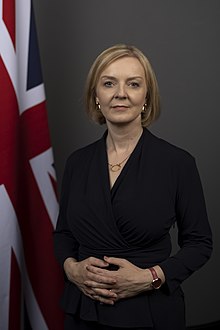 Official portrait, 2022 | |
| Premiership of Liz Truss 6 September 2022 – 25 October 2022 | |
| Monarchs | |
|---|---|
| Cabinet | Truss ministry |
| Party | Conservative |
| Seat | 10 Downing Street |
|
| |
| ||
|---|---|---|
|
Foreign Secretary Ministry and term Post-premiership |
||
Liz Truss's tenure as Prime Minister of the United Kingdom began on 6 September 2022 when she accepted an invitation from Queen Elizabeth II to form a government, succeeding Boris Johnson, and ended 49 days later on 25 October upon her resignation. As prime minister, she served simultaneously as First Lord of the Treasury, Minister for the Civil Service, and Minister for the Union.
Truss defeated Rishi Sunak in the July–September 2022 Conservative Party leadership election on 5 September and was appointed prime minister the following day. Elizabeth II's death on 8 September caused government business to be suspended during a national mourning period of 10 days. In response to the cost-of-living crisis and energy supply crisis, the Truss ministry announced the Energy Price Guarantee, which reduced energy prices for households, businesses, and public sector organisations. Kwasi Kwarteng, then Chancellor of the Exchequer, announced large-scale borrowing and tax cuts in a mini-budget on 23 September. The mini-budget was widely criticised and largely reversed, having led to financial instability.
Truss dismissed Kwarteng without explanation on 14 October and appointed Jeremy Hunt to succeed him. Suella Braverman resigned as Home Secretary on 19 October after admitting to having used her personal email address to send a Cabinet document. Her resignation letter was critical of Truss's government. On the evening of 19 October, MPs voted to reject a motion which would guarantee parliamentary time for a bill to ban fracking in the UK. The vote was controversial as it was unclear whether a three-line-whip had been issued to Conservative MPs, ordering them to vote against it. Allegations of "manhandling" and intimidation were made by a number of MPs against some government ministers. Following these events, together with mounting criticism and loss of confidence in her leadership, Truss announced on 20 October her intention to resign as party leader and as prime minister. Sunak was elected unopposed as her successor and succeeded her as leader on 24 October and as prime minister on 25 October.[1][2][3]
- ^ "Sunak officially becomes Prime Minister after meeting King". BBC News. 25 October 2022. Archived from the original on 31 January 2023. Retrieved 25 October 2022.
- ^ Nevett, Joshua; Whannel, Kate (20 October 2022). "Liz Truss resigns: PM's exit kicks off another Tory leadership race". BBC News. Archived from the original on 20 October 2022. Retrieved 27 October 2022.
- ^ Brown, Faye (25 October 2022). "Penny Mordaunt pulls out of Tory leadership race, paving way for Rishi Sunak to become next PM". Sky News. Archived from the original on 26 October 2022. Retrieved 24 October 2022.



